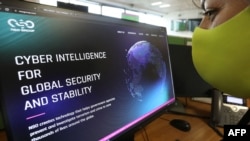Sophisticated spyware poses an "existential" threat to investigative journalists, causing sources to remain silent for fear of being identified, a U.S. media watchdog warned Thursday in a report.
Echoing demands by dozens of NGOs, the Committee to Protect Journalists (CPJ) called for an immediate moratorium on the development, export, sale and use of spyware until robust guarantees are implemented to safeguard journalists.
"I know for a fact that a lot of people are scared to talk to me. A lot of people are scared of writing me, they're scared that my phone is watched," Moroccan journalist Aida Alami, who works for The New York Times, said in the report.
The same is true of Hungarian journalist Szabolcs Panyi, who works for the Direkt36.hu website and whose name appeared among those targeted by Israeli-made Pegasus spyware in a scandal that broke in 2021.
"The biggest fear now is that this [Pegasus] affair will have a chilling effect on sources, and paradoxically this enormous scoop will hinder our work in the long run," Panyi was quoted as saying in the report.
More worryingly for the CPJ, "old methods of defense don't work" against the latest surveillance tools, which don't require a target to click on a link or download an attachment but simply receive "an unanswered call" or even "an invisible text message."
"There's nothing new about governments or criminal gangs spying on journalists or activists," the report says.
"But the development of high-tech 'zero-click' spyware — the kind that takes over a phone without a user's knowledge or interaction — poses an existential crisis for journalism and the future of press freedom around the world."
When the latest spyware has infected a phone, "it can eavesdrop on a call before encryption takes place, much like reading a letter over a writer's shoulder before it is sealed in an envelope."
The committee, which details the cases of four countries (Mexico, Hungary, Morocco and India), warns that "even in democratic societies, the political will to restrict spyware," which is also used for purposes such as monitoring suspected terrorists, "may be lacking."
Beyond a moratorium, CPJ calls for import and export restrictions on countries that use these technologies as a tool of repression and for the creation of an international treaty limiting their trade.
The committee called on companies that develop this software to make a public commitment to press freedom and include explicit clauses in contracts and licenses prohibiting spying on journalists.
The CPJ said the companies should revoke access to spyware when abuse is detected and reported.




